- Home
- Tim LaHaye
The Rising: Antichrist Is Born Page 3
The Rising: Antichrist Is Born Read online
Page 3
As unconventional a marriage as it was in modern Romania, there was no rancor, no acrimony. Sure, they got on each other's nerves. But she knew passionate couples with a passel of kids, husbands and wives unafraid of actual public displays of affection, who were also known to live their lives at decibel levels high enough to attract the attention of the police. She could be grateful, she guessed, that she and Sorin largely got along.
So if there was anything to Viviana Ivinisova's speculation that Marilena's name aptly described her--the
22
bitter part, the emptiness, the loneliness--the hole in her heart had nothing to do with Sorin, except that if she wanted to fill it, her husband was the logical vehicle.
The maternal instinct had ambushed her most incongruously one afternoon as she rode the bus home from the university. For days she had surprised herself by finally noticing the children who cavorted at the playground in the park near their apartment. Strange, she thought, that she had been only vaguely aware of them for years, and now she found herself watching with interest until she disembarked and headed across the street to her building.
Marilena found herself particularly taken with a young girl, probably five or six years old. Nothing was unique about the child, except that she had caught Marilena's eye, and the woman enjoyed her smile and her manner for the few moments she saw her each day.
Then came the day of the miracle. Marilena didn't know what else to call it. As she got off the bus the little girl deftly launched herself over the wrought-iron fence that separated the children from the busy street. "Oh, child!" Marilena called out, as the girl dashed past her and raced in front of the bus, which had not yet begun to move.
The little girl was chasing something. A ball? An animal? She looked neither right nor left. Marilena caught the bus driver's eye. He shook his head, waiting with his foot obviously on the brake as Marilena followed the child into the street.
23
Seemingly from out of nowhere a black sedan crossed the double yellow line and passed several cars, sending others sliding to the curb. It was heading directly for the little girl! Marilena froze, screaming, but the girl never looked up. She knelt in the street, reaching for a kitten that bolted away at the last instant.
There was no way the car could miss the child. Marilena grimaced and clamped her eyes shut, waiting for the screech of tires and the killing thud. But it never came. She forced herself to peek and saw the car appear to pass right through the child and slide into the only parking spot left in front of her building.
Marilena expected the driver to leap from the car and check on the girl, but no one emerged. Several pedestrians rushed the car, Marilena following once she was sure the little girl was safely back in the park. People huddled around the car, peering into it, brows knitted. It was empty. A man laid his palm on the hood. "It's cold," he said. "Wasn't this the car?"
The others, Marilena included, assured him it was. The man felt the tires. "Cold," he said.
To a woman of letters, this was more than strange. Marilena dared not even tell Sorin. A driverless car dematerialized as it bore down on a child? He would have laughed in her face.
That night she and Sorin sat reading at their respective desks. Both were Grafting new curricula for the next term and occasionally tried ideas out on each other. Their courses were as far afield from marriage, home life, family, and children as they could be, and yet in the middle
24
of casual conversation about required reading lists, Marilena was suddenly overcome.
She felt a longing so deep and severe that she could describe it--only to herself, of course--as physical pain. She would not have been in the least surprised had Sorin asked what was troubling her. How she was able to camouflage it and continue the conversation confounded her to this very night on the bus. It had been as if her very existence depended upon being held, loved, cherished, and--if possible--being allowed the inestimable privilege of holding, loving, and cherishing another.
Marilena had looked at Sorin in a new way, albeit only briefly. Was this an epiphany? Did she love him, want him, long for him? No. Simply no. Here was a man who, despite his prodigious intellect, held no appeal to her in any other way. He sat there late in the evening, hunched over his desk, reading, writing, thinking, discussing, still dressed in the suit and tie he had taught in all day. His only concession had been to slip off his shoes and suit jacket and loosen his tie. Years before she had given up urging him to change his clothes after work.
And his feet stank. Well, that was petty, she knew. She had her foibles and idiosyncrasies too, not the least her utter lack of interest in feminizing herself. So what was this, this visceral bombardment she could not ward off? In a flash Marilena knew, though she was certain it had never crossed her mind before. She needed, desperately wanted, a child.
It wasn't that they had never discussed having chil-
25
dren. Sorin had established early in their relationship that he wanted no more children and hoped that was not an issue with her. She had assured him she felt no such inclination and couldn't imagine herself a mother, let alone imagine a willingness to give up the time in her precious pursuit of knowledge. End of discussion.
Her late mother had raised the question more than once, of course. But Marilena had been so adamant in her refusal to discuss it that Sorin had actually stepped out of character and offended his mother-in-law by scolding her. "If you don't mind my saying so," he said, "and I'm sure that you do, your daughter has made herself quite plain about this, and thus it is no longer any of your business."
Marilena had on one hand felt embarrassed for her mother, while on the other she appreciated her husband's defense.
So with her mother long in the grave and her marriage long since having become a construct of intellectual convenience, what was she to do with this new emotion? It had been all she could do to muster the restraint to keep from blurting out, "Sorin, would you reconsider giving me a child?" Marilena told herself she had ingested too much mamaliga, the mush she made from cornmeal that even Sorin admitted was her specialty. Too much of it had caused discomforting dreams before, but never while she was awake.
Sorin had asked her something, or had he made a suggestion about her new syllabus? "I'm sorry," she said. "Would you care for some tuiccrt" He had raised a
26
brow, as if wondering what that possibly had to do with whatever it was they were discussing.
The plum brandy sped to her bloodstream with enough force to effect some equilibrium. Marilena was able to keep her impulses in check and not say anything that might alarm Sorin. If she knew anything about their evolving relationship, it was that her husband fled real, personal interaction--and what could be more personal than this?
Marilena had been relieved in the days following her epiphany when her urge seemed to have waned. But it would sneak up on her again at the most absurd moments. She might be tidying the apartment, doing the dishes with Sorin, or simply reading. Most disconcerting was that, without fail, every time the need for a child to love and to love her emerged, it was magnified exponentially from the time before. Marilena had devised schemes to fight it off. She developed an inner dialogue, "self-talk" her psychology faculty friends would have called it. She called herself names, told herself she was being selfish, childish, unrealistic. She asked herself who she thought she was and told herself to be practical.
Generally these tactics worked, at least temporarily. When Marilena really thought it through, somehow extracting herself from the emotion of it, she realized there was not room in her life, certainly not in Sorin's, and absolutely not in their apartment, for a child-- especially a newborn. Impossible.
For weeks, months even, Marilena had become more
27
and more inclined to stand her ground against the emotion. She believed she had learned to detect nature about to attack, and she would begin her self-talk immediately. "Don't start," she would tell he
rself. "This is just not going to happen."
It was not long, however, until a baby was on her mind every waking moment. Oh, it was not as if she had found ways to make it make sense. Rather she came to resign herself to the fact that this torment might forever be with her. Was there some other option, some avenue that might satisfy this instinct? Should she support an orphan, send money to a children's cause?
Marilena had never been one to buy into easy diagnoses of depression. She had always been able to chase a low mood by immersing herself more deeply into her reading and studying and teaching. Colleagues admonished her for equating clinical depression with the blues, rightly intimating that someone of her intellect should know better.
She had become depressed and she knew it. She would not seek counsel or treatment. Nothing could fix this. The need for a child had become part of her being, and the knowledge of its impossibility left her in despair.
Ironically, it had been that very paradox that had spurred her interest in a new pursuit. She had seen the ads in academic journals and even one of the many local papers: "Seeking something beyond yourself? Come and be astonished." She had seen posters around the faculty offices with the same message but had paid them no more heed than had her colleagues.
30
"Perhaps," she said, surprising herself. It was only a maneuver, but she desperately hoped he would not act on it. And if he did, what form would it take? He wouldn't be leaving the apartment he had owned since his first wife evicted him from their home years before. Would he turn Marilena out?
To her relief, he'd let the matter drop, only raising it again several days later when she wore him down with her toxic indifference.
"Marilena, are you about to leave me?"
"Mentally or physically?"
"Don't play games, dear. We both know you have long ago emotionally deserted. What is it you want?"
"You know."
"I don't!" And it was clear from his look that he really didn't. She had let too much time pass from the original request. "Tell me!"
"I want you to go with me to see what these Tuesday evening sessions are about."
He stood. "That's all? For that you have put on this charade for weeks? Tell me that is not all you are upset about."
"That's it."
"That's ridiculous."
She couldn't argue. It was such a small thing. And yet it was also such a simple request. Why could he not cater to her just this once, step outside his conventions?
Then he had been quiet, clearly angry. Occasionally he would appear prepared to continue the argument, then wave it off and turn back to his work. Finally, apparently
31
unable to concentrate, he'd said, "Heaven help us if you ever find something legitimate to be upset over."
"If this is so trivial, Sorin, the remedy is trivial too. Don't disparage my feelings. I want you to go to a one- hour meeting some Tuesday evening. Is that so much to ask?"
"That's not the issue," he said. "It's the transparent nature of the meeting. It will offend my every sensibility and, I hope, yours."
"Maybe it will. Of course, you're right. But humor me. I don't want to go alone."
"So if I accompany you once, you promise to return to civility?"
"Twice."
"Twice? What if you are repulsed after the first meeting?"
"Then you're free."
"Twice. If I go twice--"
"That's all I ask."
Ray had been invited to Bobby Stark's house Friday for dinner and overnight. He would ride with Bobby and his parents to the Saturday soccer game.
Ray couldn't wait. He watched the big clock on the classroom wall all day, especially after he and Bobby had plotted during lunch and recess what all they would do that evening. "Mom's fixin' a big meal, and we can play laser hockey, video games, watch movies, whatever."
32
Bobby dressed like a rich kid, so Ray could only assume his house would be cool. He wasn't disappointed. It was no palace, nothing like Ray himself would own one day when he was a pro athlete or a pilot, but it was sure something compared to his house.
Bobby had two younger sisters who wanted to be involved in everything, but any time Ray showed them attention, they blushed and giggled and ran off squealing. Bobby just hollered at them and told on them until his mother made them leave the boys alone.
At dinner Mr. Stark asked Ray if he wanted to say the blessing.
"The what?"
"The blessing, son. Say grace. You're a Christian, aren't you? Go to church?"
"'Course. Every Sunday. You mean pray?"
"That's what I mean."
"Well, um, okay." Ray bowed his head and closed his eyes, folding his hands over his plate. "God is great; God is good. Now we thank Him for our food. Amen."
The little sisters laughed aloud, and Bobby couldn't stop a guffaw even with his palm pressed to his mouth. "That's your prayer?" he said.
"Robert!" his mother said.
"Sorry."
"Yeah, that's my prayer. What about it?"
"That's how you pray for a meal?"
"Yeah, so?"
Mr. Stark cleared his throat. "How about your father, Raymond?"
33
"It's Rayford."
"All right. Is that how your father prays over a meal? I mean, I'm just curious. It's a child's prayer. Uh, you're a child, but you're becoming a man."
Ray wanted this conversation over. What in the world was it with these people? "Do you want me to pray like my father prays? I can."
Mrs. Stark set down a bowl she had apparently meant to pass. "Yes, that would be nice." Everyone closed their eyes again.
"For what we are about to receive," Ray said, "may we be truly thankful. Amen."
"Amen!" the girls chorused.
Ray got the impression that Bobby and his parents were again amused but had decided not to humiliate him further. At breakfast he was not going to be talked into praying again; that was for sure. For one thing, those were the only two prayers he knew, other than "Now I lay me down to sleep; I pray thee, Lord, my !r soul to keep. If I should die before I wake, I pray thee, jf Lord, my soul to take." He could only imagine their reaction to that.
Bobby seemed to quietly study him that evening, and Ray was hoping they wouldn't start talking about anything serious. No such luck. While they were setting up the video-game controls, Bobby said, "That's how you pray at your house, eh?"
Ray shrugged. "We don't pray a lot. Just for meals and at bedtime."
"Really?"
34
"Yeah."
"And it's those made-up, rhyming prayers?"
Ray sighed. "What're we supposed to do--pray like the preacher?"
"What church do you go to, anyway?" Bobby said.
"Central."
"The big one on the corner downtown? Do they believe in Jesus?"
"'Course they do. What do you think?"
"I don't know. Some churches don't."
"Those would be synagogues," Ray said.
"How about you, Ray? You believe in Jesus?"
"I told you! I go to Central every Sunday."
"So you've got Jesus in your heart?"
Ray just wanted to play. What was this? "In my heart? What's that mean?"
"How long you been going to this church?"
Ray pushed the controls aside and sat back on the couch. "My dad grew up in Central Church. He's real religious."
"And your mom?"
"She grew up in Michigan, but yeah, she's religious too."
"They're Christians?"
Ray shook his head. Bobby didn't seem this dense at school. "'Course they are. Did you think we were Jewish?"
"Well, it's not like you're either Jewish or Christian."
"We're sure nothing else!"
"You've got to have Jesus in your heart, Ray. That's the deal."
1
35
Ray picked up the controller, hoping Bobby would drop the subject.
/> "Do you, Ray?"
"Do I what?"
"Do you have Jesus in your heart?"
"Look, Bobby, I've been going to Central Church since I was born, and I never heard anything about getting Jesus in your heart. But there's pictures of Him everywhere, even in the windows, and He's what the pastor preaches about. Just because we don't call it whatever your church calls it doesn't mean we're not religious too."
"It's not about religion," Bobby said, sounding to Ray like something a Sunday school teacher might say. "It's about being a true Christian."
"lam!"
"Not unless you've got Jesus in your heart."
Now Ray was mad. "And what if I don't?"
"Then you're going to hell."
"What!?"
"That's what the Bible says. You have to tell God you know you're a sinner and--"
"I'm no sinner."
"Your church doesn't teach that everybody's a sinner?"
"No!"
"It's right in the Bible. It says everybody has sinned."
"I'll bet my mom hasn't."
"Bet she has."
"Bobby, you don't know what you're talking about. I don't know everything about what our church teaches,
36
but I think we believe everybody's good at heart. We try to do good things all the time, do what God wants us to do."
Bobby sat there shaking his head.
Ray wanted to pop him. Look down at me, will ya? And you're not even as smart as I am. "What?" Ray said.
"Your church teaches that people are good at heart?"
"I don't know, Bobby. Come on; let's do something."

 Glorious Appearing: The End of Days
Glorious Appearing: The End of Days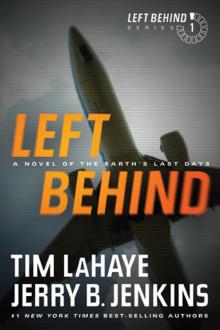 Left Behind: A Novel of the Earth's Last Days
Left Behind: A Novel of the Earth's Last Days Kingdom Come: The Final Victory
Kingdom Come: The Final Victory Nicolae: The Rise of Antichrist
Nicolae: The Rise of Antichrist Desecration: Antichrist Takes the Throne
Desecration: Antichrist Takes the Throne Mark's Story: The Gospel According to Peter
Mark's Story: The Gospel According to Peter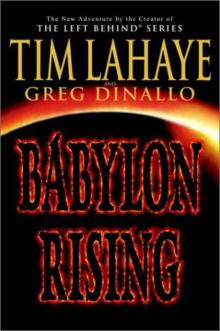 Babylon Rising
Babylon Rising Thunder of Heaven: A Joshua Jordan Novel
Thunder of Heaven: A Joshua Jordan Novel The Edge of Darkness
The Edge of Darkness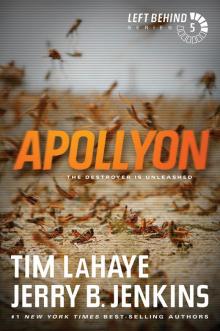 Apollyon: The Destroyer Is Unleashed
Apollyon: The Destroyer Is Unleashed Armageddon: The Cosmic Battle of the Ages
Armageddon: The Cosmic Battle of the Ages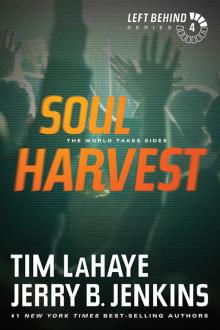 Soul Harvest: The World Takes Sides
Soul Harvest: The World Takes Sides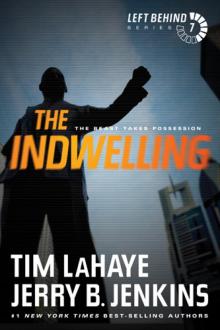 The Indwelling: The Beast Takes Possession
The Indwelling: The Beast Takes Possession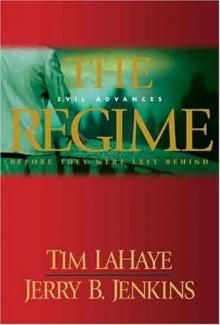 The Regime: Evil Advances
The Regime: Evil Advances The Rapture: In the Twinkling of an Eye / Countdown to the Earth's Last Days
The Rapture: In the Twinkling of an Eye / Countdown to the Earth's Last Days The Remnant: On the Brink of Armageddon
The Remnant: On the Brink of Armageddon John's Story: The Last Eyewitness
John's Story: The Last Eyewitness The Europa Conspiracy
The Europa Conspiracy Mark of Evil
Mark of Evil Brink of Chaos
Brink of Chaos The Mark: The Beast Rules the World
The Mark: The Beast Rules the World 04 The Edge of Darkness
04 The Edge of Darkness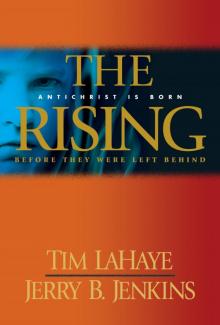 The Rising: Antichrist is Born / Before They Were Left Behind
The Rising: Antichrist is Born / Before They Were Left Behind Babylon Rising: The Edge of Darkness
Babylon Rising: The Edge of Darkness 03 The Europa Conspiracy
03 The Europa Conspiracy Desecration
Desecration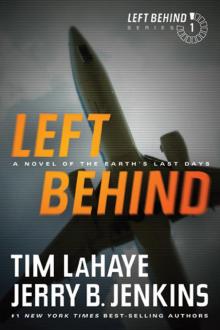 Left Behind
Left Behind The Remnant
The Remnant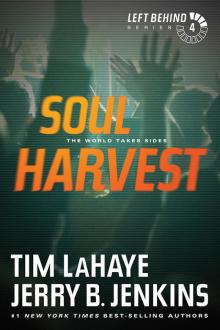 Soul Harvest
Soul Harvest Left Behind Book 13: Kingdom Come The Final Victory
Left Behind Book 13: Kingdom Come The Final Victory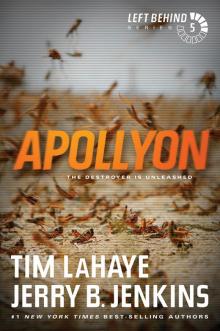 Apollyon
Apollyon 02 Thunder of Heaven: A Joshua Jordan Novel
02 Thunder of Heaven: A Joshua Jordan Novel Glorious Appearing
Glorious Appearing The Rapture: Evil Advances / Before They Were Left Behind
The Rapture: Evil Advances / Before They Were Left Behind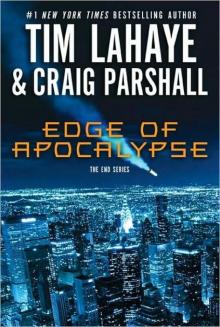 Edge of Apocalypse
Edge of Apocalypse Tribulation Force
Tribulation Force The Left Behind Collection: All 12 Books
The Left Behind Collection: All 12 Books Black Friday
Black Friday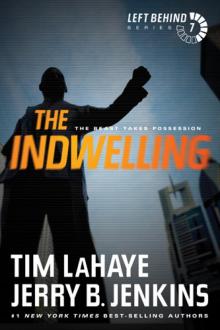 The Indwelling
The Indwelling The Left Behind Collection
The Left Behind Collection